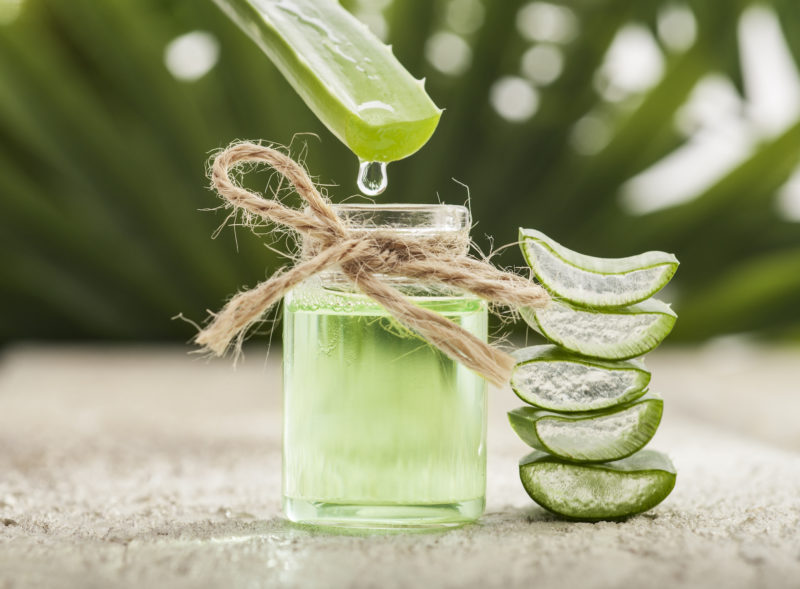Walking down grocery store aisles, you are bound to come across something with aloe in it, from drinks and food to hair care and lotions. It would actually be shocking for you to not find something that is related.
At this point, you have to wonder, is it all hype? Can the plant really do what people say it can do?
Let’s take a deeper look at some of the most popular theories.
It is said to help with acne.
Because aloe vera contains antioxidants and vitamins, it is believed to help protect skin. But does this translate to a reliable acne treatment?
One study published in the Journal of Dermatological Treatment suggests this is, indeed, true — at least for the gel.
Researchers created a topical ointment made up of tretinoin and the gel for mild to moderate acne. 60 subjects were studied; some were given the first treatment and others were given a different formula.
The gel formula had positive feedback, being described as “well-tolerated” and “significantly more effective” than the other treatment.
That’s pretty cool, right? But why do researchers think that it worked?
Well, the plant can help naturally support the body’s response to inflammation. This is due to to its polysaccharide content that helps reduce the promotion of prostagandin synthesis and leucocytes.
And remember, acne is a type of inflammation, the tale-telling symptom being red, inflamed skin.
More study is needed for other more aggressive forms of acne, and if the gel can be used on its own as a topical ointment.
It can help promote clear skin and anti-aging.
Okay, this one definitely sounds like a stretch, right? Anti-aging? Yeah, right.
But knowing how the gel can be beneficial for acne, it may be a little easier to understand where theories about where this idea originates.
But does this theory actually hold up?
Well…potentially, yeah!
Specific polysaccharides from this plant’s gel, called mucopolysaccharides, support skin moisture and the appearance of wrinkles. Other phytonutrients, including amino acids, also help encourage skin elasticity, which promotes softness.
So, maybe aloe can’t turn back time, but it can help the skin appear younger. One study published in the American Journal of Infection Control explored this benefit.
The study focused on assembly-line workers (30 women) who had occupation-related, dry and irritated skin. They were subjected to wearing gloves that were outfitted with aloe vera for multiple hours of the day, for 30 days.
So, was the experiment a total bust? Nope!
Researchers found that the subject’s skin had improved, with decreased appearance of fine wrinkling, dermatitis and dry skin.
Aloe vera can help hydrate.
Moving along from the benefits of topical gel, let’s look into oral consumption. Drinking its juice, or water mixed with the juice, is thought to help support hydration.
On this side of the spectrum, research becomes a little more sparse. Much of the benefits of consumption can be attributed to anecdotal evidence, which doesn’t sit right with everyone.
So if that’s not your thing, this benefit may be a “no-go.”
Healthline reports that this consumption can help promote healthy hydration, primarily due to the spiky plant’s naturally water-density. That makes sense, especially as the juice is described as “refreshing.”
The health authority also goes on to say that the juice may be a good way to rehydrate after workouts, specifically because more fluids are needed to help decrease lactic acid afterward.
But like coconut water, more research would be necessary to confirm hands-down, although it wouldn’t hurt to try.
It can help with digestion.
Oral consumption is also said to also help with digestion. This is because the green plant holds specific enzymes that aid in breaking down sugars and fats, which support smooth digestion.
Its water content has also been seen as an asset for digestion. Healthline suggests that increasing water content in the intestines can help stimulate peristalsis, which also supports smooth digestion.
So, if you’re having a little stomach distress, a swig of aloe juice/water could help do the trick. In fact, one double-blind study found that its laxative-like property helped relieve constipation.
Studies have explored how this digestive support affects disorders and diseases, like irritable bowel disease (IBD) and ulcerative colitis, but more study is needed to determine it exact efficacy. So far, it’s a mixed bag: some people have reported improved symptoms; however, others says there’s no effect.
It could help support immunity.
Aloe vera is sometimes is seen as a “superfood” or “miracle” food due to its many properties, especially due to its supposed ability to help support the body’s immune system.
So, where does this theory stem from?
This green and refreshing plant contains special antioxidants called flavonoids, tannins and carotenoids, which may help support the body’s response to oxidative damage. By doing so, this can help the immune system properly function at its best.
The plant’s enyzmes may also help support nutrtion absoprtion, which can help support immune response.
Ready for a Taste?
Interested in seeing what all the buzz is about? Give our aloe vera products a look on PurePlanet.com.
Sources and More Info:
https://www.healthline.com/health/food-nutrition/aloe-vera-juice-benefits#1
https://www.ncbi.nlm.nih.gov/pmc/articles/PMC2763764/#CIT7
http://www.mdpi.com/1420-3049/13/8/1599/htm

